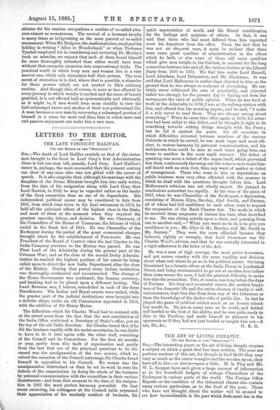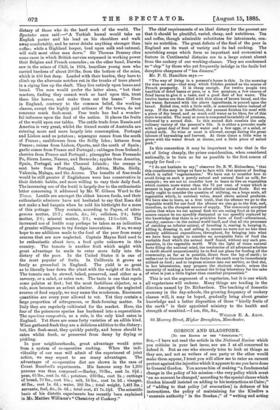THE ART OF LIVING CHEAPLY.
(To THE EDITOR OF THE "SPECTATOR."
Six,—The interesting paper on the art of living cheaply reopens a subject on which a great deal has been written. The poor are perforce masters of this art, for though in food thrift they may vary as much as the senior wrangler and the wooden spoon, they have all to live—or starve—upon a little. M. le Play and Mr. W. L. Sargant have each given a large amount of information as to the household budgets of cottage Chancellors of the Exchequer in various parts of the world. The Foreign Office Reports on the condition of the industrial classes also contain many curious particulars as to the food of the poor. Those who have not thought about the matter will be amazed to see how inconsiderable is the part which flesh-meat has in the dietary of those who do the hard work of the world. The Spectator once said :—" A Turkish hamal would take an English porter and his load on his shoulders and walk away comfortably, and he never drinks anything stronger than coffee; while a Highland keeper, bred upon milk and oatmeal, will walk most other men down." Sir Thomas Brassey cites some cases in which British navvies surpassed in working power their Belgian and French comrades ; on the other hand, Darwin saw in the mines of Chili, in 1834, beardless young men who carried burdens of about 200 lbs. from the bottom of the mine, which is 450 feet deep. Loaded with their burden, they have to climb up the alternate notches cut in the trunks of trees placed in a zigzag line up the shaft. They live entirely upon beans and bread. The men would prefer the latter alone, " but their masters, finding they cannot work so hard upon this, treat them like horses, and make them eat the beans." Even in England, contrary to the common belief, the working classes, except the highly paid artisans of the towns, do not consume much flesh-meat. Free trade has had a wonder- ful influence upon the food of the nation. It places the fruits of the world upon our tables. The cattle trade from Russia and America is very great, whilst the tinned meats of Australia are entering more and more largely into consumption. Portugal and Lisbon send us potatoes ; asparagus comes from the south of France ; cauliflowers from the Scilly Isles; lettuces from France ; onions from Lisbon, Oporto, and the south of Spain ; garlic comes from France and Portugal ; cabbages from Ireland ; cherries from France and Portugal ; pineapples from Fernando Po, Sierra Leone, Nassau, and Bermuda; apples from America, Spain, Portugal, and the Channel Islands ; the orange is sent here from Portugal, Spain, Africa, Malta, Sicily, Valencia, Malaga, and the Azores. The benefits of free-trade would be still greater if Englishmen were less conservative in their dietetic habits, and more willing to vary their daily food. The increasing use of the lentil is largely due to the enthusiastic letter concerning it addressed by Mr. W. Gibson Ward to the Times. Lentils are amongst the oldest known foods, and their enthusiastic admirers have not hesitated to say that Esau did not make a bad bargain when he sold his birthright for a mess of this pottage- They contain, according to Payen, of nitro- genous matter, 25.2; starch, &c., 56; cellulose, 2'4; fatty matter, 2'6; mineral matter, 2'3; water, 11'5=100. The increased use of lentils may perhaps be taken as an indication of greater willingness to try foreign innovations. If so, we may hope to see additions made to the food of the poor from many sources that are now neglected. Captain Mayne Reid used to be enthusiastic about taro, a food quite unknown in this country. The tomato is another fruit which might with great advantage be made to enter more fully into the dietary of the poor. In the -United States it is one of the most popular of fruits. In California it grows as freely as gronndsel in England. The yield is so great as to literally bear down the plant with the weight of its fruit. The tomato can be stewed, baked, preserved, used either as a savoury, or a salad, or eaten raw. The taste is one that repels some palates at first; but the most fastidious objector, as a rule, soon becomes an ardent admirer. Amongst the neglected sources of food supply, we may name the mushroom. Enormous quantities are every year allowed to rot. Yet they contain a large proportion of nitrogenous, or flesh-forming matter. In Italy they are regularly cultivated for the market. Here, the fear of the poisonous species has hardened into a superstition. The agaricus campestris, as a rule, is the only kind eaten in England. Yet there are some forty varieties of an edible kind. When gathered fresh they are a delicious addition to the dietary ; but, like flesh-meat, they quickly putrify, and hence should be eaten whilst fresh, or preserved from decay by drying or
pickling.
In poor neighbourhoods, great advantage would arise from a system of co-operative cooking. When the indi- viduality of our race will admit of the experiment of joint action, we may expect to see many advantages. The advantages of co-operative diet are shown in the case of Count Rumford's experiments. His famous soup for 1,200 persons was thus composed :—Barley, 70 lbs., cost 5s. 9 d. ; peas, 65 lbs., cost 3s. 6d. ; potatoes, 230 lbs., cost 2s. ; cuttings of bread, 70 lbs., cost 106.; salt, 18 lbs., cost ls. 2d. ; vinegar, 46 lbs., cost ls. 6d. ; water, 282 lbs. ; total weight, 1,4811bs. ; servants, fuel, &c., 3s. 6d.; total cost, 21 7s. 5id. The scientific basis of his dietetic experiments has recently been explained in Mr, Mattieu Williams's " Chemistry of Cookery." The chief requirements of an ideal dietary for the poorest are that it should be plentiful, varied, cheap, and nutritious. Tea and coffee, though admirable substitutes for intoxicants, con- tain no nutrition. The great defects of the food of the poor in England are its want of variety and its bad cooking. The nourishing soups which form so important and economical a feature in Continental dietaries are to a large extent absent from the cookery of our working-classes. They are condemned as " slop" by those who yet frequently indulge in the facile but deceptive cheapness of " tea dinners."
Mr. P. G. Hamilton says :—
" The way of living in a peasant's house is this. In the morning the men eat soup—that soup which Cobden praised as the source of French prosperity. It is cheap enough. For twelve people two handfuls of dried beans or peas, or a few potatoes, a few ounces of fried bacon to give it a taste, and a good deal of hot water. The twelve basins are then filled with thin slices of brown bread, and the hot water, flavoured with the above ingredients, is poured upon the bread. Boiled rice, with a little milk, is sometimes taken instead of soup. If the soup is insufficient, the peasant finishes his meal with a piece of dry bread, and as much cold water as he likes, for of this there is no stint. The meal at noon is composed invariably of potatoes, followed by a second dish. In this second dish consists the only culinary variety of the peasant's life. It is either a pancake made with a great deal of flour and water and a few eggs, or a salad, or clotted milk. No wine or meat is allowed, except during the great labours of haymaking and harvest. At these times a little wine is given with the water drunk at dinner, and a little piece of salted pork."
In this connection it may be important to note that in the art of living cheaply, the prime consideration, when considered nationally, is to turn as far as possible to the first source of supply for food :— " I do not hesitate to say," observes Dr. B. W. Richardson, "that this consideration brings us face to face with that system of feeding which is called vegetarianism.' We have not to consider how to avoid living on such a purely animal and natural food as milk, for
; we are not to consider how to learn to live on vegetables which contain more water than the 75 per cent. of water which is present in legs of mutton and in other similar animal foods. But we really ought to consider the question of utilising, on a large scale, all vegetables which, in nutrient value, stand above animal products. We have also to learn, as a first truth, that the oftener we go to the vegetable world for our food the oftener we also go to the first, and,. therefore, to the cheapest source of supply. The commonly accepted notion that when we eat animal flesh we are eating food at its prime source cannot be too speedily dissipated or too speedily replaced by the knowledge that there is no primitive form of food—albuminous„ starchy, osseous—in the animal world itself, and that all the processes of catching an inferior animal, of breeding it, rearing it, keeping it, killing it, dressing it, and selling it, means no more nor no less than entirely additional expenditure, throughout, for bringing into what we have been taught to consider an acceptable form of food the veritable food which the animal itself found, without any such pre- paration, in the vegetable world. With the light of these natural facts filling the national mind, the tendencies of all advanced scholars in thrift should unquestionably be to find out plans for feeding all the community, as far as is possible, direct from the lap of earth ; to endeavour to discover how the fruits of the earth may be immediately utilised as food ; and to impress science into our service, so that she, in her laboratories, may prepare the choicest viands, minus the necessity of making a lower animal the living laboratory for the sake of what is just a little higher than cannibal propensities."
This is not the argument of a vegetarian, but it is one which all vegetarians will endorse. Many things are tending in the direction named by Dr. Richardson. The teaching of domestic economy in the day-schools, the growing frequency of cookery classes will, it may be hoped, gradually bring about greater knowledge and a better disposition of those " kindly fruits of the earth" in their appointed ministry to the health and strength of mankind.—I am, Sir, &c.,
WILLIAM E. A. AXON.
66 Murray Street, Higher Broughton, Manchester.



































 Previous page
Previous page